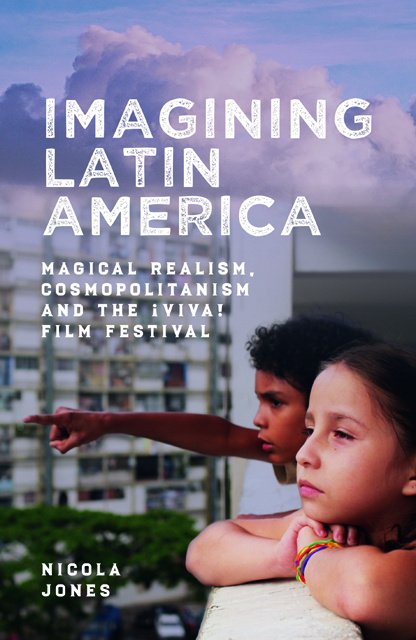Book contents
- Frontmatter
- Contents
- List of Illustrations
- Acknowledgements
- Introduction: Latin American Culture in the UK
- 1 British Identity, Cosmopolitan Anxieties and the Latin American Other
- 2 Latin America and Magical Realism in the British Press (1940–2015)
- 3 Cultural Consumption in Manchester
- 4 The Production of Latin America through ¡Viva!
- 5 Consuming Latin America through ¡Viva!
- Conclusion
- Appendix 1: Analysis of the British Press (1940–2015)
- Appendix 2: ¡Viva! Post-Screening Questionnaires and Interviews
- Bibliography
- Index
Introduction: Latin American Culture in the UK
Published online by Cambridge University Press: 14 January 2023
- Frontmatter
- Contents
- List of Illustrations
- Acknowledgements
- Introduction: Latin American Culture in the UK
- 1 British Identity, Cosmopolitan Anxieties and the Latin American Other
- 2 Latin America and Magical Realism in the British Press (1940–2015)
- 3 Cultural Consumption in Manchester
- 4 The Production of Latin America through ¡Viva!
- 5 Consuming Latin America through ¡Viva!
- Conclusion
- Appendix 1: Analysis of the British Press (1940–2015)
- Appendix 2: ¡Viva! Post-Screening Questionnaires and Interviews
- Bibliography
- Index
Summary
During the summer of 2017, one song dominated the UK charts, spending eleven non-consecutive weeks at Number One. That song was Despacito, a reggaeton-Latin pop fusion by Puerto Rican singer Luis Fonsi and Puerto Rican rapper Daddy Yankee. The version which hit Number One in the UK contained lyrics in English and Spanish by Canadian singer Justin Bieber remixed with the original Spanish-language song. The original and remixed versions achieved unprecedented worldwide success. In October 2020, the music video for the original Spanish-language version became the first video to hit seven billion views on YouTube, making it the video-hosting website’s most viewed upload to date.
Whether you are sick and tired of hearing the opening bars to Despacito by now or not, the fact that a song almost entirely in Spanish spent eleven weeks at the very top of the UK chart was and remains both a little surprising and intriguing. In a country that a year earlier had voted to leave the European Union, projecting an isolationist and increasingly nationalistic image to the world, the popularity of Despacito with the British public clearly demonstrated that the Latin American, and the consumption of Latin American culture in particular, remains highly attractive for many British consumers. While some might attribute the popularity of Despacito to a catchy rhythm and the illusive promise of sun, sex and sensuality amidst a dreary British summer, it is undeniable that Latin American culture more broadly has become increasingly popular and prevalent within mainstream British society over the past few decades.
Since the 1980s, for example, mainstream British audiences have developed a keen interest in salsa, beginning with the salsa clubs opened by Latin American migrants in major UK cities and expanding to encompass the vast array of salsa classes held in fitness centres, dance studios, bars and nightclubs up and down the country today. The late 1990s and early 2000s saw Latin music becoming popular in the UK beyond salsa, evidenced by the success of the Buena Vista Social Club, the rise in popularity of tango and the success of international recording artists such as Jennifer Lopez, Ricky Martin and Shakira in the UK pop charts.
- Type
- Chapter
- Information
- Imagining Latin AmericaMagical Realism, Cosmopolitanism and the ¡Viva! Film Festival, pp. 1 - 12Publisher: Boydell & BrewerPrint publication year: 2021



